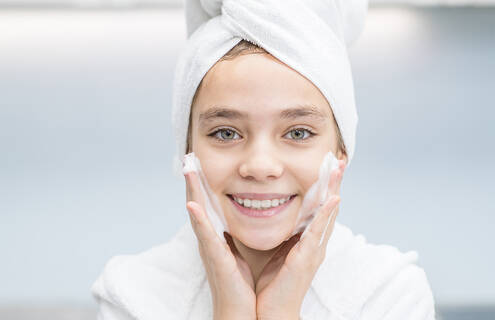
Is your pre-teen girl suddenly interested in buying expensive facial creams to fight aging skin?
Don’t get swayed, says Dartmouth Health Children’s Dermatologist, Katherine A. Su, M.D.
“Good skin care for young girls is very simple,” she says.
The beauty market is targeting kids
Online marketing of beauty products for young girls is growing, and “Gen Alpha”—those kids born 2010 onwards—are buying.
According to a report by Neilsen last fall, kids between the ages of 6 and 17 were behind a more than 36 percent uptick in sales of facial moisturizers last year.
Not surprisingly, brands seeing the most growth are those with a strong online presence, influencers behind them, and TikTok followers.
Buying brand-name facial products has become so trendy that "Sephora kids"—coined off of a popular beauty retailer—is now a term for tweens and children who follow skin care beauty trends.
Don’t let them fall victim to packaging
But what’s most important for kids has not changed, says Su. That’s keeping to the basics like making sure kids wash their face and wear sunscreen.
“Good skincare is simple, especially for young girls,” she says. “Wash two times a day with a gentle skin cleanser, washing off oil and dirt which can clog up pores and lead to acne.”
That means paying attention to ingredients, not to marketing claims, says Su. “In general, pre-adolescent girls without acne do not need products with extra ingredients like benzoyl peroxide or salicylic acid," she says. Ingredients like these can result in rashes, especially in younger girls with sensitive skin. Creams with anti-aging ingredients, serums, and tonics are not necessary for young girls. For example, retinol can strip oil, irritate skin, and lead to redness, says Su.
Much more important for good skin care is wearing sun protection. Su says, “SPF should be at least 30 and non-comedogenic,” which means formulated not to clog pores.
What to say when your child asks
Given the growing popularity of these products, it may be only a matter of time before your child starts asking to buy them.
“Parents can acknowledge that peers and social media can make these products seem very appealing,” says Su. “But they also can tell their children that it is the job of these companies to sell these products.”
“In general, not until their twenties should they be considering creams with anti-wrinkle ingredients,” she says. But when or if your child does have a genuine skin concern, seeing a dermatologist is still a good idea.